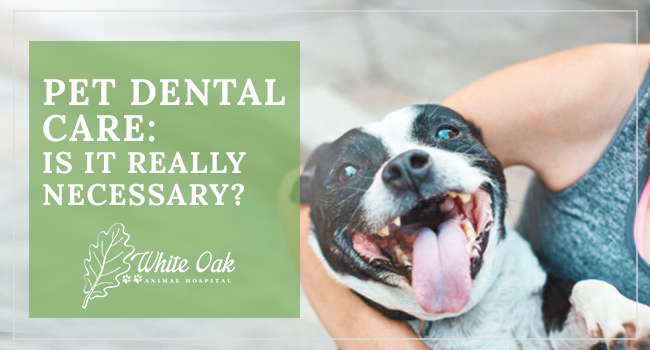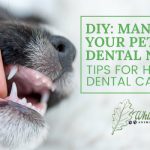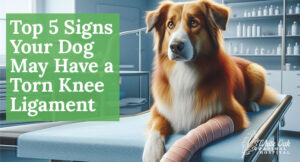I can usually count on it at least once a week.
I follow the doctor into the room of an overly-apologetic client, shaking her head, disgusted with the smell of her dog.
“I’ve given Frank bath after bath, and I cannot get rid of this smell!”
Many times I’ve smelled this smell. Many times this stench has smacked me in the face so hard on Monday morning that my coffee goes down the drain instead of down the hatch.
You can only imagine the look on the owner’s face when we tell her the source of the smell is coming straight from the mouth.
Unfortunately, dental care in our furry friends is commonly overlooked. In fact, most cats and dogs over the age of 3 are affected by periodontal disease of some form.
Just like humans, animals need dental care too!
Aside from obvious reasons (bad breath, broken or loose teeth, pain), keeping your pet’s mouth in tip-top condition is good for their overall health.
How you ask?
As bacteria builds up in your pet’s mouth, it is deposited into the bloodstream. The major organs (heart, kidneys, liver and lungs) get first dibs on the circulated blood.
In the case of a dumpster mouth, these precious organs get a good ‘ole helping of bacteria-packed blood. Over time, this leads to heart disease, kidney disease, liver problems, etc.
Getting the picture?
Pets with poor dental hygiene are also at greater risk for: jaw fractures, bone infection, tissue/bone loss around the teeth, and nasal fistulas (a hole leading from the oral cavity to the nasal cavity).
Diabetes mellitus and periodontal disease have also been shown to affect one another.
“I’m just not comfortable putting my pet under anesthesia. Is it really necessary?”
Absolutely.
Because of the bacteria being released into the bloodstream, removing tartar below the gumline is the most critical part of the dental procedure. The tartar removed from the exposed surface of the tooth is purely cosmetic.
I don’t know about you, but even I don’t like sitting still in the dentist chair. Imagine a bunch of hairless, tail-less, foreign barking creatures holding you down under bright lights while they try to shove something under your gums.
Removing tartar from the surface of the tooth can be difficult at times too. Sometimes breaking this tartar loose requires the use sharp or pointed tools, which can be dangerous to a frantic animal.
As for anesthetic risks, a pre-anesthetic exam and bloodwork is highly recommended (and sometimes required) before going under any anesthetic procedure.
In most cases, the end result of dental disease far outweighs any anesthetic risks. And, with the right preliminary care and strict anesthetic monitoring, that risk can stay down!
“Well what if I brush Mona’s teeth at home?”
Taking care of your pet’s teeth at home is always an encouraged practice.
Brushing your pet’s teeth, providing supervised bone/chew toy time and using water additives can be a great help when preventing dental disease.
However, unless you can manage to brush all surfaces of your dog or cat’s teeth every day, then it is simply not enough.
“So how often will my pet have to have a dental procedure done?”
It varies from pet to pet.
Many things affect how often your pet has to have their teeth cleaned. Anatomy of the mouth, breed, how often they use chew toys, whether or not they get preventive home care, etc.
Some animals need dental care twice a year and some can go every year or two. Your veterinarian should check your pet’s mouth during their annual physical. He/She should be able to let you know when Fido needs a dental again.
Signs your pet may need a dental may include:
- Pawing at the mouth
- Mouth odor
- Reluctance to eat/chew
- Mouth pain
- Bleeding gums
- Loose teeth
Have questions about the dental procedure or need to book an appointment? Contact us now!
Related Posts
-
Managing Pet Dental Needs at Home
Looking for ways to manage your pet dental care needs at home? While we…
-
When Should I Spay or Neuter My Pet?
Should I Spay or Neuter My Pet? For many years, veterinarians recommended clients spay or…
-
What Every Pet Owner Should Know About Pet Allergies
Whether human or pet, allergies usually prove to be a complicated, and sometimes frustrating, topic.…
-
Should I Take My Puppy/Kitten to See the Vet for Vaccines?
All About Puppy & Kitten Vaccines It's time for a trip to the vet for…









